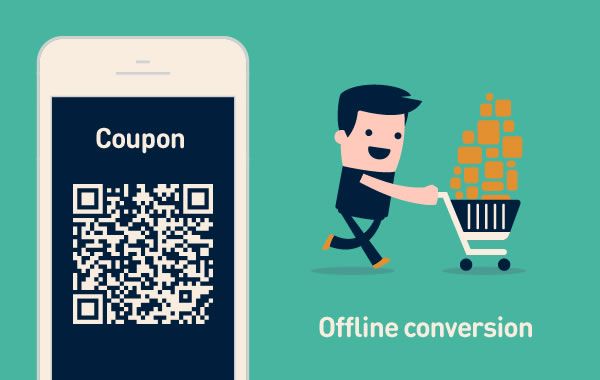Online marketing blog
Read about the latest industry trends and AdCumulus specials.
Offline conversion tracking – another way of measuring your campaigns
By on 26. April 2016.

Online advertising has a significant advantage over offline advertising – it allows you to track conversions to the marketing source that triggered them.
However, not all conversions result directly from ad click, so marketers have to find other ways of measuring the effectiveness of their campaigns. We have already written about the view-through effect. There is yet another thing that should be taken into account if you want a complete picture of your marketing efforts – offline conversion tracking.
What is offline conversion tracking?
When talking about online marketing, offline conversions are the ones that take place offline (in a physical store, over the phone, or by e-mail) after the customer has been exposed to some form of online advertising.
For example, Ben sees an online ad for a language school. He clicks on it and gets redirected to the school’s landing page. He finds its phone number on the page, makes a call and signs up for a language course. And there you have it – an online-influenced offline conversion!
But how can we connect two different events if one of them (advertising) happened online, while the other one (conversion) was made in the offline world?
Since there is no direct way for joining online to offline data, marketers have to be creative.
How can you track offline conversions?
- Custom phone numbers
If you close your sales over the phone, you can track where your leads are coming from by using a special phone number on your website, or assigning a unique phone number to each site visitor. When customers make calls, all further leads and sales can be appropriately assigned to the site visitors who converted offline. This way, it is possible to track which page the customers was looking at before they made the call.
- Web coupons, special offers and promotions
Coupons are a low-cost way to track online-influenced offline conversions. If you use coupons on your landing pages, you can easily know how your leads found you. Offering a discount for anyone who brings a coupon is not only a good way to know where your customers came from, but also to attract more leads.
- In-store pickup
Click and collect or In-store pickup is a service that enables customers to collect their items at the specific store location after an online reservation, instead of having them shipped to their home address. Although it can be used as a tracking method, in-store pickup can also improve customer experience and drive sales as well.
After customers have made their purchase, they can receive their invoice, guarantee, loyalty points, etc. by e-mail. When that e-mail is opened in the browser, it is possible to connect individuals (e-mail receivers) with their online behavior through the previously gathered data (such as cookies).
- Linking DMP to CRM system
Another way to see how online and offline channels intersect is to integrate cookie data from a DMP with offline CRM data. Combining that data can enable a unified view of customers who move across online and offline channels through their buying cycle. For example, a CRM system contains data about the current or prospective customers of a certain company. That data can be on-boarded and activated within a DMP system to find out if any of those “offline“ customers were previously exposed to any form of online advertising (for example, if they visited the company’s website).
- Ask your customers how they found out about you
The oldest and easiest way to find out how your customers found out about your business is to simply ask them. Most customers will gladly share that information, and you will get valuable data without too much effort.
Get a better picture
If you advertise online, but close (some of) your sales offline, you may be missing a lot of valuable data by not tracking offline conversions.
Not all ads work well. If you don’t know which ads bring you leads, how can you be sure that your advertising budget is well-spent?
Offline conversions can help you understand which online advertising efforts work and which don’t. Stop relying on luck and consider tracking offline conversions. They might not be completely precise, but they are definitely a useful indicator of the offline impact of your online presence.






Comments